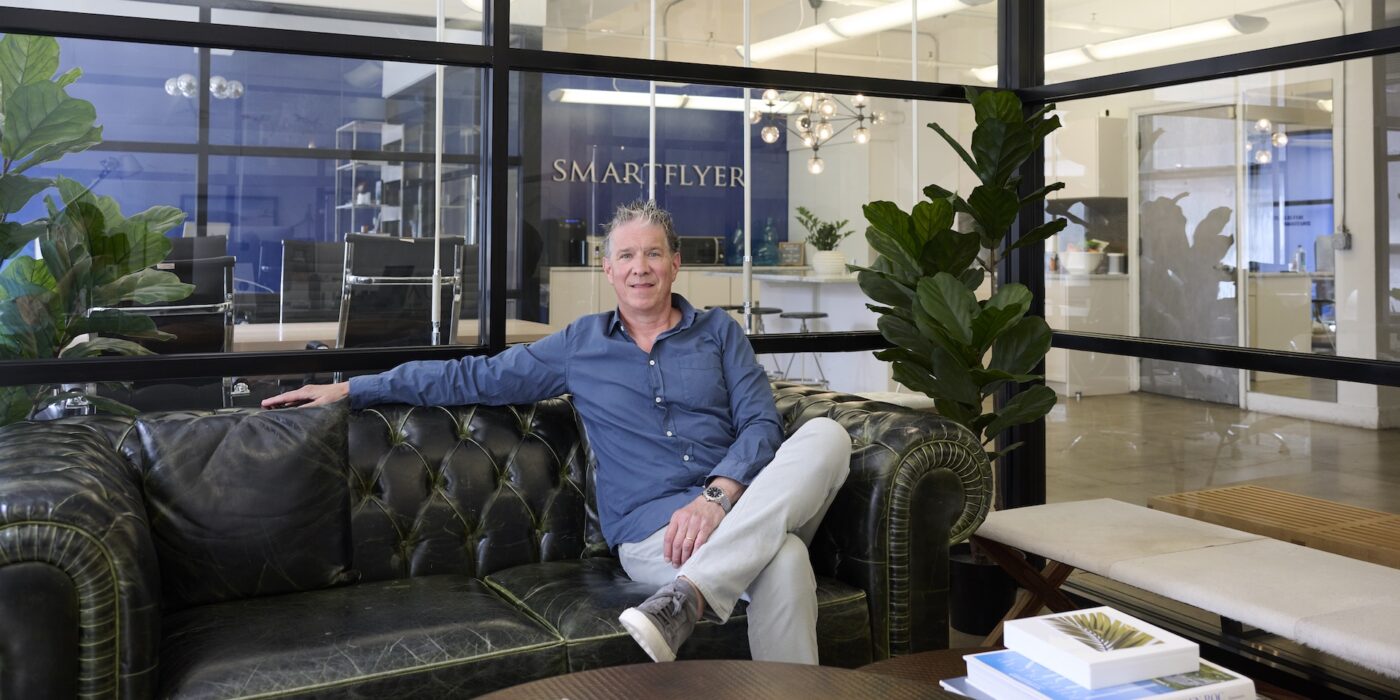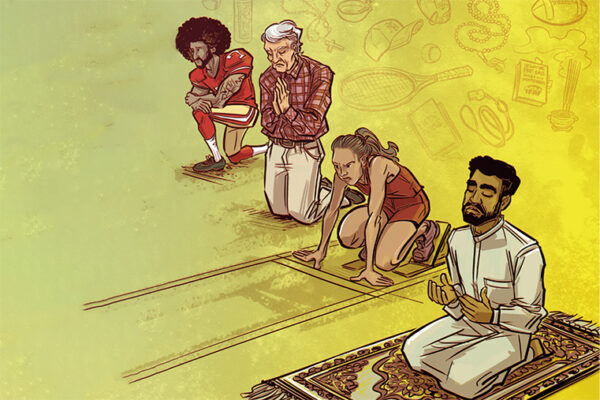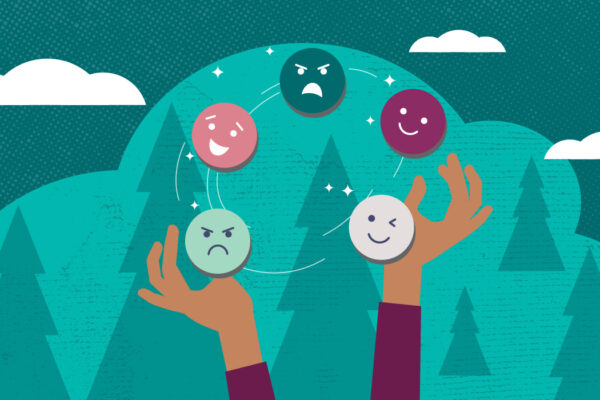First comes the thrill. A trip to the Hershey chocolate factory — what greater wonder at age 5? At 7, a flight to London, with the big clock and the solemn Beefeaters in their fuzzy black hats. But by the time Michael Holtz, BS ’87, enrolls at Washington University, travel is also a game.
These are the early days of frequent-flyer promotions, and both Newark and St. Louis are TWA hubs. By flying back and forth from his Long Island home and routing stops in Columbus and Chicago, he can hit six sectors and win a free trip to Hawaii. A born logistics whiz, he majors in industrial engineering and, for a Fortran class, expands Ozark Air Lines, drawing spokes to cities not yet serviced and writing commands to move a fleet of three DC-9s around.
Now, he is obsessed with travel efficiency. At airport counters, he picks up all the timetables (tech is still low) and studies them the way other people read novels. Soon he can rattle off the best route anywhere for anybody who asks, a skill he brings to the company he starts in 1990. Holtz’s SmartFlyer caters to “luxury travel” — but not as it is usually defined.
“People hear ‘luxury’ and think Four Seasons or the Ritz, white tablecloths and turndown service,” Holtz says. “But I think it’s travel that gives you a great story. Habitas Bacalar is a relatively new brand in Mexico, and you’re in this amazing property that focuses on wellness and serves you delicious, healthy food, and yeah, there might be a few bugs, because you’re sleeping in tented camps at the edge of the Mayan lagoon — to me, that’s luxury.”
His award-winning agency caters to high-end travelers who are curious, not timid and persnickety. For one man, luxury is a chance to ride horseback on Nihiwatu Beach, hidden from daily obligation on a pristine island in Indonesia. And who cares that it took four flights to get there? “Most of our clients want to explore the world, and they understand where they’re going and why.”
Based in an airy white office in Manhattan’s Garment District, the walls bright with retro travel posters, SmartFlyer agents travel and research nonstop. Painted across a mirror is the blithe assertion that “jet lag is for amateurs.” Holtz swears he’s never felt that lag, and he spurns sleeping pills, wine and elaborate timing. “I just go with it,” he says. “There’s so much psychology in everything we do.”
Speaking of things that will mess with a traveler’s head: Did he let himself be grounded by COVID? “We were in Rwanda when it broke,” he recalls. “We got back to New York, and I didn’t travel for two months. Memorial Day came, and my wife said, ‘We have got to get back on the road.’ So, we bring our masks and our rubber gloves and our dog and fly to Grand Rapids.”
From there, he learned to travel safely — or at least with a level of risk he felt comfortable with, because safety never comes with a guarantee. Like many of his clients, he stuck to this country, rediscovering destinations like “Bozeman, Montana; Maine; going to Wyoming for the first time.” The surprise, adventure and beauty that had drawn him to his favorite international destinations could be found, he realized, at home. Meanwhile, the domestic destinations and resorts that had always been SmartFlyer’s favorites were becoming more popular than ever. “Amangiri, in Utah, was booked to the rafters.”
“When you travel, you discover the challenges and customs of people different from yourself. Travel helps create understanding.”
Michael Holtz
New enthusiasms have not limited Holtz’s horizons, though. Married in Paris on New Year’s Eve 2019, he and his wife were supposed to go to the Maldives in 2020, but … COVID. Now that famously beautiful archipelago — more than 1,000 tiny coral islands floating in crystal-clear water — is back in his sights. And scheduling won’t be hard.
“Work from home has become work anywhere,” he points out. “Just four years ago, the remote work opportunities were nowhere near as sophisticated as they are now. There’s Wi-Fi at the airports and hotspots in cities, and whatever your calling program is, it’s likely worldwide. People who had long commutes have gotten back hours of their lives. And they can take the opportunity to pack up the whole family to spend July in Tuscany, working while they’re there.”
Holtz knows the ins and outs of minimizing stops and cleaning up an itinerary. He praises the hubs Qatar and other airlines have developed in the Middle East and the ease of reaching so many African destinations on Turkish Airlines. He was thrilled to see Lufthansa set up a hub in St. Louis, which has already become one of that airline’s most successful cities, with people snapping up trips to more than 100 destinations with only one stop in Frankfurt.
Beyond speed and ease, he is also canny about creating value and adding experience. Instead of making the usual stop in Bangkok, why not fly to Phuket on Korean Air and spend a few days at Angkor Wat on your way? Why not book a room at the Condado Vanderbilt Hotel in San Juan on your way to St. Barts and fly the next morning instead of arriving at 10 p.m. the night before? “You’re maximizing your time with every leg of the trip.”
It’s tough to imagine Holtz’s life without travel. But what about the rest of the world — what would be lost? “Travel helps bring cultures together,” he says slowly. “When you travel, you discover the challenges and customs of people different from yourself. Travel helps create understanding.”
It also continues education, and he has made it his life’s work to learn the world. Over the years, he has watched Bhutan develop mindfully, its emphasis — like that in mineral-rich Botswana — on caring for its environment. He has become adroit at communicating across borders, and he has built work relationships that span the globe.
That, too, started in college.
“I loved my education at WashU, and what I loved most was that the student body was so diverse,” he says. “I learned how to work with people from different cultures, how to learn from different cultures. Today, we have more than 300 people in our organization, and we interact with thousands of partners around the world on a daily basis. And I’m grateful.”



